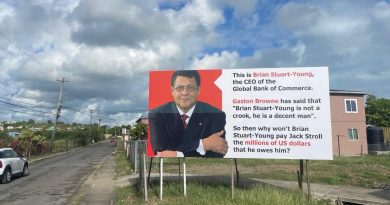Local professionals uncomfortable with Chinese ointment being dispensed in clinics with formal approval
While the Ministry of Health reportedly is singing the praises of an
ointment donated by the Government of China, local healthcare
practitioners are asking about its approval for use by the local
authority.
According to the last week’s Cabinet Notes, Minister Molwyn
Joseph called the Chinese ambassador to express appreciation
for the gift of this ointment – which was not identified – since the
medication has been curing diabetic ulcers that had been
considered incurable.
However, one practitioner is less impressed and is concerned that
the community clinics have been dispensing an ointment that has
not been approved for use here.
“There is no approval from the IRB Committee,” she says in
strong disapproval. “This is using Antiguans as guinea pigs. This
is so unethical.”
The IRB is an Institutional Review Board that is recognized by the
Food and Drug Administration in the United States to formally
review and monitor biomedical research involving human
subjects.
Accordingly, other critics are asking how – with the high incidence
of diabetes in developed Western societies – no such “wonder
drug” has been developed or distributed by their major
pharmaceutical companies. And they, too, are worried that locals
could be being used as test subjects for an unapproved drug.
“If it’s so good,” asks one diabetes patient – who uses insulin but
has no ulcers – “then why can’t they tell us the name? Even if it’s
not in English, it must have a name,” she says.
Concerns arose earlier this year when, on his return from China,
Minister Joseph announced that Antigua and Barbuda could
become the first country in the region to receive a cancer-
prevention vaccine that has been developed in China.
In the wake of the COVID-19 pandemic and the reported medical
problems associated with the vaccines taken, many residents
have vowed they will resist any effort to inoculate them with this
new drug.




